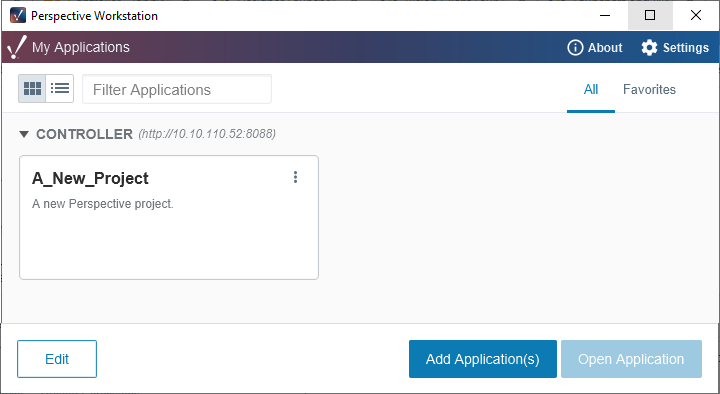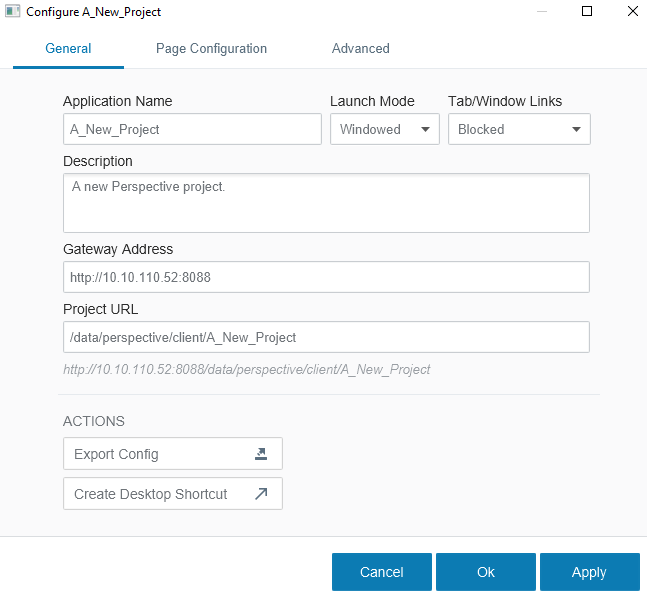Perspective Workstation
Perspective Workstation is a single application that functions as both a launcher and a desktop wrapper for Perspective Sessions. It allows you to run Perspective projects as desktop applications designed for HMIs, panel PCs, and dedicated workstations.
Perspective Workstation supports both Windowed mode and full-screen Kiosk mode, which helps reduce distractions from the underlying operating system. It also provides features for managing applications on dedicated workstations with multiple monitors, allowing sessions to launch on specific displays.

Perspective Workstation can only launch sessions from Ignition 8.1 or newer Gateways.
Managing Workstation Settings
Perspective Workstation application settings are specific to each Perspective Session. To access Workstation settings, click the three dots menu for the Session application and select Manage. This will open the project's Configure popup where you can adjust the Perspective Workstation Application Settings. Some settings are automatically populated from previous setup configurations.
Some settings are automatically populated when you open the Manage view and navigate between configuration screens.
Launch Modes
Perspective Workstation supports both Windowed mode and full-screen Kiosk mode. These modes determine how the Session window behaves and how much access users have to the underlying operating system.
Tab and Window Links
The Tab/Window Links setting controls how Perspective Workstation handles links that would normally open in a new browser tab. You can configure these settings to allow links to open in the system browser, open within Workstation, or be blocked entirely.
Multi-Monitor Support
Perspective Workstation supports multi-monitor configurations by allowing a single application to open multiple operating system windows, with each window displayed on a different monitor. Each monitor can display a different Perspective page.
When you configure multi-monitor settings, Workstation automatically detects available displays and lists them on the Page Configuration tab. You can assign a Perspective page to each display and designate a primary display for login dialogs and authentication prompts.
If the Page field is empty, no content appears on that display. If the field contains a Page URL, Workstation loads the specified page on that monitor. The Identify Displays option provides an on-screen overlay that helps you match display numbers to physical monitors.
The default Display 1 Page URL for a new application is /, which loads the default page configured in the Designer. For more information on configuring pages within the Designer, see Page Configuration.
Perspective Component Actions and Scripts
Perspective components can access Workstation-specific features that allow projects to control Workstation behavior.
-
The Component Events and Actions page describes the Workstation component action, which allows a running Workstation application to switch launch modes.
-
The system.perspective.workstation scripting namespace provides additional functions that allow you to interact with a running Workstation application.
Perspective Workstation Application Settings
To access application settings, click the three dots menu for the Session application and select Manage. The sections below describe the available configuration options.

Perspective Workstation application settings are configured per application. To configure settings that apply to the Launcher itself, see the Launcher Settings page.
General Application Settings
| Property | Description |
|---|---|
| Application Name | Specifies the name of the application as it appears in the Launcher. |
| Launch Mode | Specifies how the application launches by default. Available options include:
|
| Tab/Window Links | Specifies how Workstation handles links that would normally open in a new browser tab. Available options include:
|
| Description | Provides a description of the application. The description appears on the My Applications screen. |
| Gateway Address | Specifies the Gateway address in the format http[s]://host:port. |
| Project URL | Specifies the URL path of the Perspective page that loads when the application starts. |
Page Configuration Settings
| Property | Description |
|---|---|
| Identify Displays | Displays overlay labels that identify available monitors. |
| Page | Specifies the Perspective page to display on the assigned monitor. |
| Primary Display | Specifies the display used for logins and authentication dialogs. |
Advanced Fallback Redirect Settings
Connection Settings
| Property | Description | Property Type |
|---|---|---|
| Connect Timeout | Specifies how long Workstation attempts to connect to the Gateway before giving up. The duration is measured in seconds. | value: integer |
| Retries | Specifies how many connection attempts occur before Workstation redirects to the fallback application. | value: integer |
Fallback Redirect Settings
| Property | Description | Property Type |
|---|---|---|
| Fallback Redirect | Enables fallback redirect behavior for the application. The default value is false. | value: boolean |
| Fallback Application | Specifies the application that launches if the master Gateway connection is unavailable. The list includes applications configured in the current Workstation installation. | value: string |
| Auto-Return | Enables automatic return to the original application when the Gateway becomes available again. The default value is false. | value: boolean |
| Launch Delay | Specifies how long the application must remain disconnected before redirecting to the fallback application. The duration is measured in seconds, and the default value is 30. | value: integer |
Perspective Workstation On-Screen Keyboard
The on-screen keyboard does not appear when you interact directly with Perspective Workstation configuration screens.
Redundancy
Perspective Workstation supports redundant Gateway configurations to help maintain application availability during Gateway outages after a Session is successfully launched. When redundancy is configured, Workstation automatically attempts to connect to a backup Gateway if the master Gateway is unavailable at startup. If the master Gateway cannot be reached, Workstation attempts to connect to the backup Gateway. If neither Gateway is available, Workstation alternates connection attempts until a connection is established or the application is closed.
Command Line Arguments
You can launch Perspective Workstation from the command line using the arguments listed below.
| Argument | Description |
|---|---|
application | Specifies the name of the Workstation application to launch. |
debugPort | Specifies the debug port used by the launched application. The default value is 9224. |
launch.mode | Overrides the application launch mode. Available values include:
|
browser.tab.mode | Overrides the tab and window link behavior. Available values include:
|
config.json | Specifies a configuration file to use as a temporary override. The file must be a JSON export created using the Export Launcher Config option in the Workstation Settings menu. Example: |
System Requirements
Perspective Workstation uses JxBrowser and requires a supported 64-bit operating system. ARM-based operating systems are not supported. For more information, see the JxBrowser System Requirements documentation.
The bundled Perspective Workstation for macOS supports Apple Silicon only. An alternate build for Intel-based Macs is available from the Inductive Automation Downloads page.
